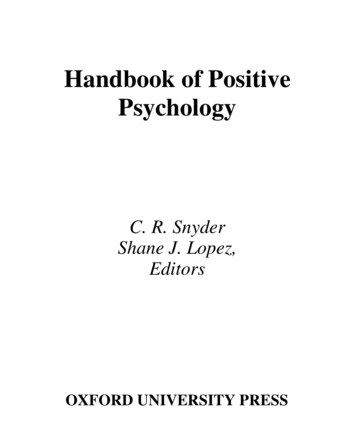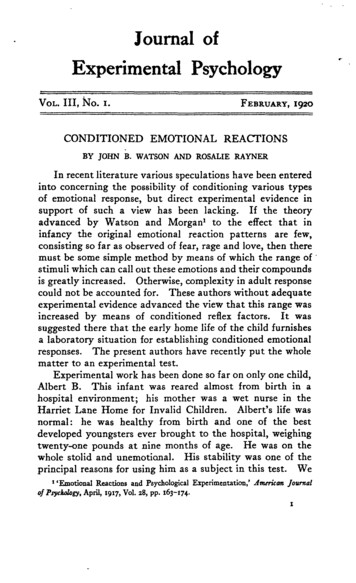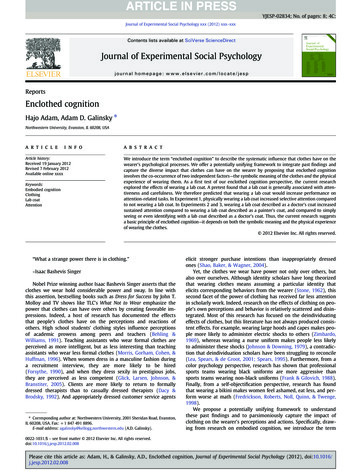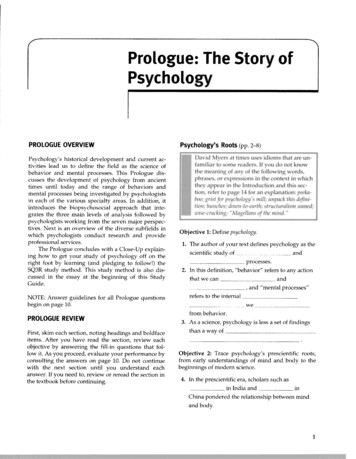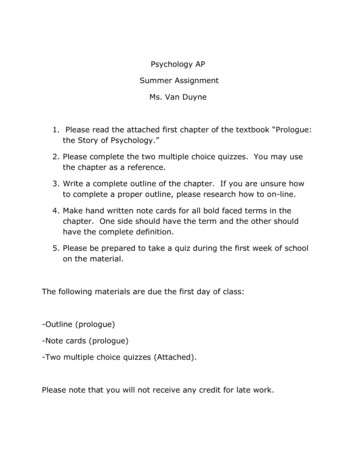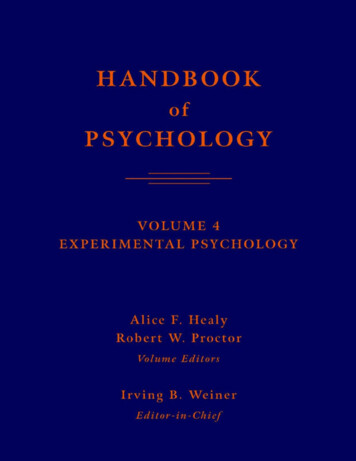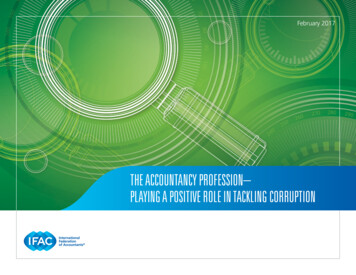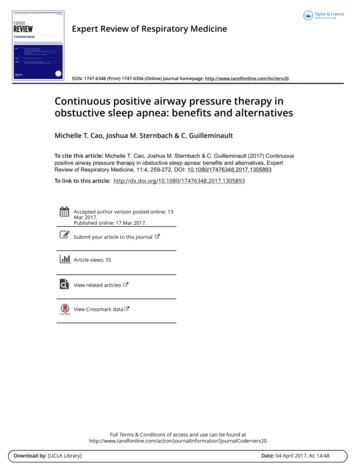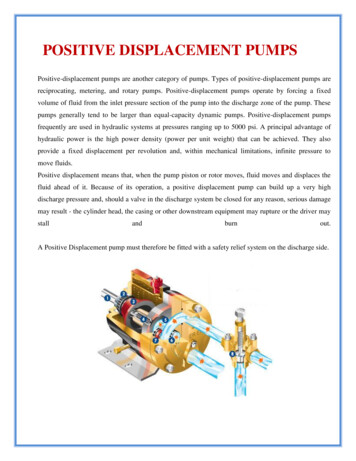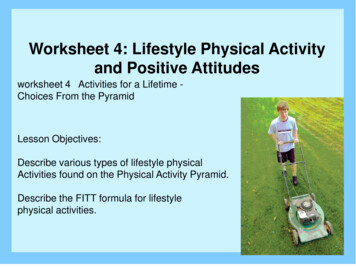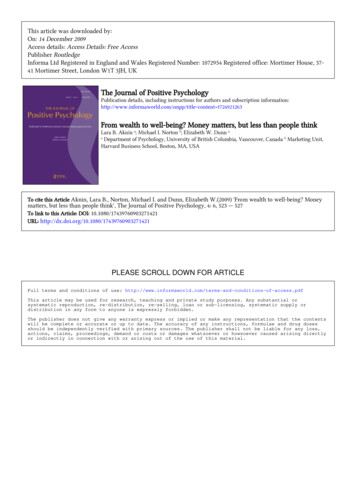
Transcription
This article was downloaded by:On: 14 December 2009Access details: Access Details: Free AccessPublisher RoutledgeInforma Ltd Registered in England and Wales Registered Number: 1072954 Registered office: Mortimer House, 3741 Mortimer Street, London W1T 3JH, UKThe Journal of Positive PsychologyPublication details, including instructions for authors and subscription information:http://www.informaworld.com/smpp/title content t724921263From wealth to well-being? Money matters, but less than people thinkLara B. Aknin a; Michael I. Norton b; Elizabeth W. Dunn aaDepartment of Psychology, University of British Columbia, Vancouver, Canada b Marketing Unit,Harvard Business School, Boston, MA, USATo cite this Article Aknin, Lara B., Norton, Michael I. and Dunn, Elizabeth W.(2009) 'From wealth to well-being? Moneymatters, but less than people think', The Journal of Positive Psychology, 4: 6, 523 — 527To link to this Article: DOI: 10.1080/17439760903271421URL: http://dx.doi.org/10.1080/17439760903271421PLEASE SCROLL DOWN FOR ARTICLEFull terms and conditions of use: f-access.pdfThis article may be used for research, teaching and private study purposes. Any substantial orsystematic reproduction, re-distribution, re-selling, loan or sub-licensing, systematic supply ordistribution in any form to anyone is expressly forbidden.The publisher does not give any warranty express or implied or make any representation that the contentswill be complete or accurate or up to date. The accuracy of any instructions, formulae and drug dosesshould be independently verified with primary sources. The publisher shall not be liable for any loss,actions, claims, proceedings, demand or costs or damages whatsoever or howsoever caused arising directlyor indirectly in connection with or arising out of the use of this material.
The Journal of Positive PsychologyVol. 4, No. 6, November 2009, 523–527From wealth to well-being? Money matters, but less than people thinkLara B. Aknina*, Michael I. Nortonb and Elizabeth W. DunnaaDepartment of Psychology, University of British Columbia, Vancouver, Canada; bMarketing Unit,Harvard Business School, Boston, MA, USA(Received 25 January 2009; final version received 29 April 2009)While numerous studies have documented the modest (though reliable) link between household income andwell-being, we examined the accuracy of laypeople’s intuitions about this relationship by asking people fromacross the income spectrum to report their own happiness and to predict the happiness of others (Study 1) andthemselves (Study 2) at different income levels. Data from two national surveys revealed that while laypeople’spredictions were relatively accurate at higher levels of income, they greatly overestimated the impact of incomeon life satisfaction at lower income levels, expecting low household income to be coupled with very low lifesatisfaction. Thus, people may work hard to maintain or increase their income in part because they overestimatethe hedonic costs of earning low levels of income.Downloaded At: 03:56 14 December 2009Keywords: income; well-being; wealth; happiness; predictions; overestimationIntroductionA striking inconsistency surrounds the relationshipbetween money and happiness. Despite the fact thatmoney has been shown to have a small (thoughreliable) effect on happiness in developed countries(Diener & Biswas-Diener, 2002; Frey & Stutzer, 2000),humans devote much of their time and energy toearning it, seemingly motivated by the belief thatmoney will have a substantial impact on their overalllife satisfaction (Ahuvia, 2008). For example, theamount of time the average American spends at workhas grown steadily over the past several decades,despite the fact that this occupational investmentcomes at the cost of family and leisure time (Schor,1991). What is the source of this apparent contradiction between researchers’ conclusions about therelatively modest link between money and happinessversus laypeople’s everyday choices and behavior?We suggest that laypeople engage in behaviorsdesigned to increase or maintain their wealth becausethey overestimate the impact that income has onwell-being.Although hundreds of studies have examined theactual link between money and happiness (see Diener& Biswas-Diener, 2002, for a review), only one studyhas examined laypeople’s intuitions about this relationship (Kahneman, Krueger, Schkade, Schwarz,& Stone, 2006). Kahneman et al. (2006) asked asample of working women with an average householdincome of approximately US 55,000 to estimate the*Corresponding author. Email: laknin@psych.ubc.caISSN 1743–9760 print/ISSN 1743–9779 onlineß 2009 Taylor & FrancisDOI: ompercentage of time they had spent in a bad mood theprevious day and to predict how much time womenwith low incomes (less than US 20,000) and highincomes (above US 100,000) spent in a bad mood;respondents were reasonably accurate in predicting thepercentage of time women with high incomes spent in abad mood, but overestimated the amount of time thatlow income women spent in a bad mood. Whileproviding an intriguing first glimpse into possiblediscrepancies between the predicted and actual impactof money on happiness, however, this study examinedonly the extreme ends of the income spectrum usingone particular demographic group over the course ofone day.In an effort to more fully delineate the natureof people’s understanding of the link between household income and happiness (an important componentin understanding why people pursue money when itdoes not seem to make them much happier) we askeda national sample of respondents from across theincome spectrum both to report their own happinessand to predict the happiness of others at different levelsof income (Study 1).1 Demonstrating that people thinkhigher household income is associated with higherlevels of happiness for someone else, however, does notnecessarily mean that they believe that more moneywould substantially influence their own happiness;in Study 2, therefore, we also asked respondents topredict how happy they thought they would be givendifferent levels of household income, to directly
524L.B. Aknin et al.measure people’s beliefs about the impact of money ontheir own happiness.Study 1To examine the accuracy of laypeople’s intuitionsabout the relationship between household income andhappiness, we asked a nationally representative sampleof Americans to report their own happiness and topredict the happiness of others. We predicted thatrespondents would correctly associate higher household income with higher levels of happiness, butincorrectly believe that the two are more tightlylinked than the actual data suggest.Downloaded At: 03:56 14 December 2009MethodsRespondentsA total of 429 Americans (56% female; Mage ¼ 40.2,SD ¼ 16.4) were selected from an online surveycompany’s panel of 2.5 million respondents withgender, age, and income parameters (see Table 1)approximating the most recent United States Census.Participants answered our questions as part of a largeronline survey, in return for points that could beredeemed for prizes.ProcedureRespondents reported their gender, age, and approximate annual household income. Household incomeinformation was gathered by asking respondents toselect the most appropriate amount from a list ofoptions because our previous research has revealedmuch higher response rates when participants areasked to select their income from a list of categoriesrather than provide their exact household income.Next, each respondent was asked ‘How would you rateyour life overall these days?’ (0 ¼ worst possible lifeoverall, 10 ¼ best possible life overall ). Finally, respondents were asked to consider 10 different householdincomes and predict the life satisfaction of someoneat each income level using the same scale (see Figure 1for income prediction levels); these household incomelevels were presented one at a time in one of fourrandomly determined orders.Results and discussionConsistent with a large body of previous research(Diener, 1984; Diener, Horwitz, & Emmons, 1985),we found that higher levels of household incomewere associated with somewhat greater happiness,as reflected by the moderate correlation (r ¼ 0.25,p 5 0.001) between actual household income andhappiness. Respondents’ predictions, however,revealed their belief in a more dramatic relationshipbetween money and happiness2 (Figure 1). Whileparticipants made fairly accurate predictions aboutthe happiness of people with high levels of householdincome (US 90,000 and above), participants vastlyunderestimated the happiness of people earning lowerlevels of household income (US 55,000 and below). Inaddition, while respondents were fairly accurate inpredicting that higher levels of household income arenot associated with higher levels of happiness at thetop end of the income distribution (e.g., at US 90,000compared with US 125,000), their predictions demonstrated a belief that lower household incomes atthe bottom end (e.g., at US 25,000 compared withTable 1. Frequency distribution of household incomecategories for Study 1 (N ¼ 429) and Study 2 (N ¼ 315).Actual householdincomeUS 1–US 4999US 5000–US 9999US 10,000–US 14,999US 15,000–US 24,999US 25,000–US 34,999US 35,000–US 49,999US 50,000–US 74,999US 75,000–US 99,999US 100,000–US 124,999US 125,000–US 149,999US 150,000–US 199,999US 200,000þStudy 1Study 2 Age MeanActual N Actual 15.7)(16.3)(16.2)Figure 1. Actual and predicted happiness levels for the10 household income point estimates in Study 1.
The Journal of Positive PsychologyUS 35,000) are associated with much lower happinesslevels than justified by the actual happiness data.Downloaded At: 03:56 14 December 2009Study 2Study 1 offers evidence that people overestimate themagnitude of the relationship between money andhappiness, particularly at the lower end of the incomespectrum. Of course, respondents were asked to makepredictions regarding how happy someone else wouldbe on various rungs of the income ladder; thereforeit is possible that their predictions reflect only theirperceptions of how happy other people would be atdifferent levels of income (for example, poor minoritiesor wealthy celebrities), rather than reflecting theirbeliefs about how they themselves would feel at thesevarious levels of income. Indeed, Epley and Dunning(2000) have shown that distinct mental processesmay underlie predictions for oneself and others. Ouraccount, however, suggests that people overestimatethe impact that making more money would havespecifically on their own happiness. Therefore, inStudy 2, we also asked respondents to predict howhappy they thought they would be with different levelsof household income, thereby directly assessing theirpredictions about the impact of money on their ownlives. If our interpretation of Study 1 is correct, thenrespondents in Study 2 should mispredict the association between money and happiness, regardless ofwhether their predictions are made in regard to othersor themselves.525household income and happiness (r ¼ 0.11, p ¼ 0.05).Supporting our account that people’s efforts to makemoney may be driven by erroneous beliefs about theimpact of household income on their own happiness,participants envisioned that household income wouldhave a similar impact on their own happiness as onothers’ happiness (Figure 2).3 Consistent with Study 1,predictions for people with high levels of householdincome were fairly accurate, but predictions for lowerlevels of household income again reflected a beliefthat income had a much bigger impact on happinessthan justified by the actual happiness data. Once again,participants were fairly accurate in predicting thathigher levels of household income were associated withslightly higher levels of happiness at the top of theincome distribution, but predicted that higher levelsat the lower end were associated with larger differences in happiness than reflected in the actualhappiness data.General discussionAcross two national samples, we found that peopleaccurately predicted the moderate emotional benefitsassociated with being wealthy, but vastly overestimatedthe emotional costs associated with being poor. Thatis, whereas predicted and actual happiness closelyconverged above the median household income,sharp divergences occurred between predicted andactual happiness at lower household income levels.While respondents accurately predicted the modestrelationship between higher earnings and happinessMethodsRespondentsA total of 315 Americans (45% female; Mage ¼ 52.8,SD ¼ 13.7) drawn from the same pool as in Study 1answered our questions as part of a larger, onlinesurvey, in return for points that could be redeemedfor prizes.ProcedureStudy 2 was identical to Study 1 except we askedrespondents to predict how happy they themselveswould be at each of the 10 income values presentedin Study 1, using a 0–100 scale (0 ¼ worst possible lifeoverall, 100 ¼ best possible life overall ), before makingthese same predictions for someone else. Finally, eachrespondent reported their overall life satisfaction ratingon the same 0–100 scale.Results and discussionSimilar to Study 1 and previous research, we observeda modest positive relationship between actualFigure 2. Actual and predicted happiness levels for bothoneself and another at the 10 household income pointestimates in Study 2.
Downloaded At: 03:56 14 December 2009526L.B. Aknin et al.at the top levels of household income, they erroneouslybelieved that slightly higher household wages atlower income levels (such as between US 25,000 andUS 55,000) would be coupled with dramatically different happiness ratings. Given that many of ourparticipants (approximately 33%) earned incomes inthis range, this failure of insight is particularly strikingand may have important implications for theseindividuals’ career decisions (e.g., whether to accepta US 10,000 pay cut in exchange for an additional dayoff each week).Our data demonstrate that respondents envisiona tighter association between money and happinessthan the actual happiness data justify. Interestingly,this overall error may reflect two different, and notnecessarily contradictory, beliefs: one interpretationof our results is that people believe that increases inincome are associated with increases in happiness,while another is that people believe that decreasesin income are associated with decreases in happiness.Support for the latter explanation stems from thelarge body of evidence demonstrating that losses aremore impactful than equivalent gains (Baumeister,Bratslavsky, Finkenauer, & Vohs, 2001; Kahneman &Tverksy, 1979), which suggests that people mightwork hard not to increase their income but merelyto ensure that it does not decrease. Indeed, thecompetitive nature of the workplace may lead peopleto fear what could happen if they are unable tomaintain their current household income, a particularly salient concern for wealthy individuals who havemore to lose.To the extent that a fear of lost income influencespeople’s predictions regarding the money and happiness relationship, we would expect a tighter relationship between wealth and well-being to be envisioned bywealthier people: those who have comparatively moreto lose. Our data offer provisional support for thispattern: using hierarchical linear modeling, we testedwhether respondents’ own income levels moderatedtheir expectations regarding the relationship betweenincome and happiness. Although respondents’ ownincome did not moderate their expectations in Study 1( ¼ 0.01, p ¼ 0.32), respondents’ income did emergeas a marginally significant moderator in Study 2( ¼ 0.30, p ¼ 0.055), such that respondents withhigher levels of income predicted a stronger associationbetween household income and well-being. Althoughtentative, these findings dovetail with previous researchsuggesting that personal expectations and perceivedfinancial situation may be key in understandingthe association between income and well-being(e.g., Johnson & Krueger, 2006; Nickerson, Schwarz,Diener, & Kahneman, 2003; Solberg, Diener, Wirtz,Lucas, & Oishi, 2002). Finally, because people oftenspend relative to their current income, a loss ofincome may actually prevent people from maintainingtheir current life standards; having to file for bankruptcy because one can no longer pay the mortgageon an unnecessarily large house may in fact lead toa real decrease in happiness. Most importantlyfrom our perspective, however, is that regardlessof whether people’s motivation lies in maintaining orincreasing their income, the actual happiness datasuggest that their expectations regarding the overallassociation between money and happiness may beexaggerated.Our claim that people overestimate the influenceof money on happiness below the median householdincome is supported by the generally high levels ofhappiness reported by our low income respondents.One clear concern about this conclusion is that our lowhousehold income sample may not be representative,perhaps heavily oversampling students and retirees;such individuals may have other resources whichinflate their happiness, meaning that these reportsmay not accurately capture the happiness of individuals making less money without such resources.While this issue is not unique to our data, we notethat the variance in age of the two lowest householdincome brackets in our sample was similar to thevariance for other household income brackets, with themean age in the mid-30s, suggesting that these groupsdid not consist primarily of students and retirees(Table 1).Taken together, our studies shed light on thediscrepancy between people’s apparent drive formoney and the real but modest relationship betweenmoney and happiness. In particular, we demonstratethat adult Americans erroneously believe that earningless than the median household income is associatedwith severely diminished happiness: a false belief thatmay lead many people to chase opportunities forincreased wealth or forgo a reduction in incomefor increased free time. Our results are in line withKahneman et al.’s (2006) suggestion that peoplefocus too much on the impact of this one variable ontheir global life satisfaction, part of a more generaltendency to overweight single inputs when estimatingoverall satisfaction (Hsee & Rottenstreich, 2004).This focusing illusion may lead individuals to ignoreother avenues shown to impact happiness, such asbuilding social relationships; indeed, while usingmoney to build relationships can lead to increasedhappiness (Dunn, Aknin, & Norton, 2008), the merethought of money can discourage people from pursuing this goal (Vohs, Mead, & Goode, 2006). Finally,while our aim was to isolate people’s beliefs aboutthe impact of money on happiness, future researchshould explore the accuracy of people’s intuitionsabout how best to trade off among different pursuits(from making money to building friendships to findingGod) on the pathway to happiness.
The Journal of Positive PsychologyAcknowledgmentsWe thank Richard E. Lucas, Emma Buchtel, Carl Falk, andMargaret Hanson for their advice and assistance.Downloaded At: 03:56 14 December 2009Notes1. We use the terms ‘happiness’ and ‘life satisfaction’interchangeably as many other researchers have in thepast (e.g., Diener & Diener, 1996; Easterlin, 2003; Frey& Stutzer, 2000). We are aware that these two conceptsare separable (Lucas, Diener, & Suh, 1996), however lifesatisfaction and happiness have been shown to correlatehighly in the past (Diener & Lucas, 2000).2. Actual household income brackets are compared with themost appropriate predicted income value(s) in Figures 1and 2 as follows: US 1–US 4999 compared to US 5000;US 5000–US 9999 and US 10,000–US 14,999 compared to US 10,000; US 15,000–US 24,999 comparedto US 25,000; US 25,000–US 34,999 and US 35,000–US 49,999 compared to US 35,000; US 50,000–US 74,999 compared to US 55,000; US 75,000–US 99,999 compared to US 90,000; US 100,000–US 124,999 compared to US 125,000; US 125,000–US 149,999 and US 150,000–US 199,999 comparedto US 160,000; and US 200,000þ compared toUS 500,000. Happiness predictions for US 1,000,000are not compared with actual happiness ratings becausewe were unable to contact a large enough sample witha comparable annual household income.3. As Figure 2 shows, predicted happiness ratings foroneself across the income spectrum (M ¼ 52.2,SD ¼ 23.1) were on average slightly higher than predictions for others (M ¼ 49.6, SD ¼ 21.2), t(295) ¼ 3.02,p 5 0.05, d ¼ 0.12, likely reflective of people’s generaltendency to see themselves as better than average(e.g., Alicke, 1985) especially when comparing themselves to an abstract target (Alicke, Klotz,Breitenbecher, Yurak, & Vredenburg, 1995).ReferencesAhuvia, A. (2008). If money doesn’t make us happy, why dowe act as if it does? Journal of Economic Psychology, 29,491–507.Alicke, M.D. (1985). Global self-evaluation as determined bythe desirability and controllability of trait adjectives.Journal of Personality and Social Psychology, 49,1621–1630.Alicke, M.D., Klotz, M.L., Breitenbecher, D.L., Yurak, T.J.,& Vredenburg, D.S. (1995). Personal contact, individuation, and the better-than-average effect. Journal ofPersonality and Social Psychology, 68, 804–825.Baumeister, R.F., Bratslavsky, E., Finkenauer, C., &Vohs, K.D. (2001). Bad is stronger than good. Reviewof General Psychology, 5, 323–370.527Diener, E. (1984). Subjective well-being. PsychologicalBulletin, 85, 542–575.Diener, E., & Biswas-Diener, R. (2002). Will moneyincrease subjective well being? A literature review andguide to needed research. Social Indicators Research, 57,119–169.Diener, E., & Diener, C. (1996). Most people are happy.Psychological Science, 7, 181–185.Diener, E., Horwitz, J., & Emmons, R.A. (1985). Happinessof the very wealthy. Social Indicators Research, 16,263–274.Diener, E., & Lucas, R.E. (2000). Subjective emotionalwell-being. In M. Lewis, & J.M. Haviland-Jones (Eds.),Handbook of emotions (pp. 325–337). New York: GuilfordPress.Dunn, E.W., Aknin, L.B., & Norton, M.I. (2008). Spendingmoney on others promotes happiness. Science, 319,1687–1688.Easterlin, R.A. (2003). Explaining happiness. Proceedings ofthe National Academy of Sciences, 100, 11176–11183.Epley, N., & Dunning, D. (2000). Feeling ‘holier than thou’:Are self-serving assessments produced by errors in selfor social prediction? Journal of Personality and SocialPsychology, 79, 861–875.Frey, B.S., & Stutzer, A. (2000). Happiness, economy andinstitutions. The Economic Journal, 110, 918–938.Hsee, C.K., & Rottenstreich, Y. (2004). Music, pandas, andmuggers: On the affective psychology of value. Journal ofExperimental Psychology, 133, 23–30.Johnson, W., & Krueger, R.F. (2006). How money buyshappiness: Genetic and environmental processes linkingfinances and life satisfaction. Journal of Personality andSocial Psychology, 90, 680–691.Kahneman, D., Krueger, A.B., Schkade, D., Schwarz, N.,& Stone, A.A. (2006). Would you be happier if you wererich? A focusing illusion. Science, 312, 1908–1910.Kahneman, D., & Tversky, A. (1979). Prospect theory: Ananalysis of decision under risk. Econometrica, 47, 263–291.Lucas, R.E., Diener, E., & Suh, E. (1996). Discriminantvalidity of well-being measures. Journal of Personality andSocial Psychology, 71, 616–628.Nickerson, C., Schwarz, N., Diener, E., & Kahneman, D.(2003). Zeroing in on the dark side of the American dream:A closer look at the negative consequences of the goalfor financial success. Psychological Science, 14, 531–536.Schor, J. (1991). The overworked American: The unexpecteddecline of leisure. New York: Basic Books.Solberg, E.C., Diener, E., Wirtz, D., Lucas, R., & Oishi, S.(2002). Wanting, having, and satisfaction: Examiningthe role of desire discrepancies in satisfaction withincome. Journal of Personality and Social Psychology, 83,725–734.Vohs, K.D., Mead, N.L., & Goode, M.R. (2006). Thepsychological consequences of money. Science, 314,1154–1156.
The Journal of Positive Psychology Publication details, including instructions for authors and subscription information: . systematic reproduction, re-distribution, re-selling, loan or sub-licensing, systematic supply or d
